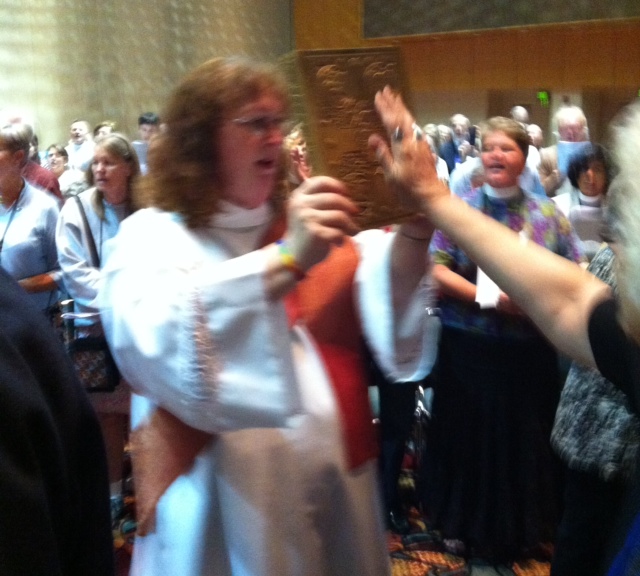Institute on Religion & Democracy Media Advisory
July 3, 2018
Contact: Chelsen Vicari, Cell: 540-239-2170, E-mail: cvicari@TheIRD.org
Austin, TX—Episcopalians gather this week for a triennial General Convention that will once again face key decisions centered upon human sexuality and expression.
Officials in a handful of domestic Episcopal Church dioceses that have opted out of the denomination’s trial same-sex marriage liturgies are warily eying the changes that the General Convention may bring.
Bishops and deputies gathered this July in Austin, Texas will consider beginning a multi-year process to add same-sex marriage rites to the Book of Common Prayer (BCP), last revised in 1979. Unlike trial liturgies, BCP content cannot be proscribed by diocesan bishops.
The denomination has shrunk precipitously since the early 2000s, with more than one-quarter of church attendees having vanished. Five dioceses and hundreds of parishes have split from the denomination since the 2003 consecration of Bishop Gene Robinson as the first openly-partnered gay bishop.
The addition of same-sex marriages conducted within the Episcopal Church has not significantly lessened a decline in the overall number of church weddings, which have dropped by 44 percent in the past decade (14,805 marriages in 2006, compared with only 8,343 in 2016, the most recent reporting year).
The Episcopal Church has approximately 1.8 million members in the United States, plus a handful of overseas dioceses primarily located in Latin America and the Caribbean. The General Convention, which meets every three years, is the denomination’s top legislative body.
Churches across the worldwide Anglican Communion, of which the Episcopal Church is a part, are divided over hot button issues like homosexuality and abortion, with U.S. church officials being more theologically and politically liberal than their overseas counterparts. IRD supports a theologically orthodox perspective that affirms traditional church teachings.
What: The 79th General Convention of the Episcopal Church
Who: 856 clergy and lay deputies of the Episcopal Church, plus nearly 300 bishops
Where: Austin Convention Center, 500 E Cesar Chavez St, Austin, TX 78701
When: Thursday, July 5 through Friday, July 13
Available for Interviews:
Jeff Walton—Anglican Program Director. Walton is the editor of IRD’s Faith & Freedom journal and will be on-site in Austin during the convention. Among the publications that have published his articles are the Christian Post, Touchstone, Forward in Christ, The Stream, The American Spectator and Human Events.
###





Comment by Roger Henry on July 3, 2018 at 4:46 pm
As I have learned as a member of the Evangelical Lutheran Chruch of America (ELCA), mainline protestantism has essentially become a vehicle for radical social activism. Theology, doctrine, and tradition no longer matters. In fact, empowered leaders openly reject it. Why do we have seminaries anymore?
Here is my story: https://www.elcatoday.com/note-to-all-elca-bishopsincluding-presiding-bishop-eaton.html
Comment by Gregg on July 3, 2018 at 8:14 pm
Roger,
I can’t believe I listened to most of the service which you posted on YouTube. If they get the “Good Housekeeping Seal of Approval” from the denomination, that should tell you all you need to know. RUN, don’t walk, from the ELCA. They are pre-Christian animists, and post-Christian secularists.
Comment by William on July 4, 2018 at 6:03 pm
How did Satan gain such a foothold in mainline Protestant denominations?
A guess —- the great deceiver was able to successfully sell ego, status, prestige, and welcoming acceptance as it became a trend among the hierarchies of these denominations, especially those in the seminaries and leadership positions, to demonstrate their intellectual/special status superiority and leadership giffedness through separating themselves out from the ordinary by doing what liberal intellectual elites do best —- challenging the Bible/Christianity with their sophisticated interpretation and analytical methods in order to render it an ancient, irrelevant relic so as to gain academic status and position standing among the liberal intellectual establishment. After all, one could never become a full member of that club without first attacking established religion (Islam the exception), especially orthodox Christianity. And, of course, challenging orthodox Christianity and the Bible by publishing books not only brought in millions but helped earn that badge of notoriety among the elite intellectual left.
In other words, they sold their souls to the devil for ego and inclusiveness in the elite intellectual left.
Comment by Walter Pryor on July 8, 2018 at 6:55 pm
I totally agree with you analysis.
I feel so sorry for all these people because they do not know God.
They do not know God! They do not know God’s sovereignty and power.
Those people have created their own god.
Comment by Sue Neff on July 7, 2018 at 6:25 pm
Sad. Praying for us all.
Comment by Sue Neff on July 7, 2018 at 6:26 pm
Sad. Praying for all of us.
Sue Neff